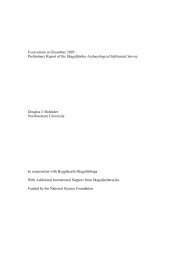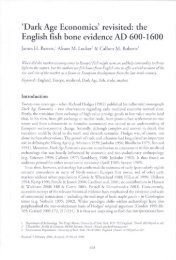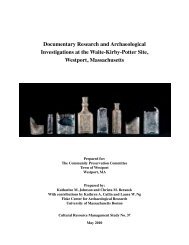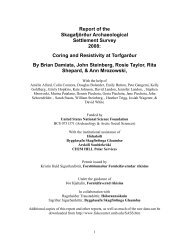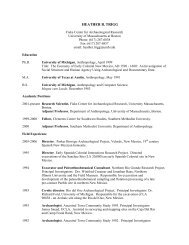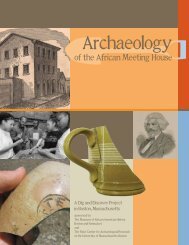Piracy in Late Roman Britain: A Perspective from the ... - Fiske Center
Piracy in Late Roman Britain: A Perspective from the ... - Fiske Center
Piracy in Late Roman Britain: A Perspective from the ... - Fiske Center
You also want an ePaper? Increase the reach of your titles
YUMPU automatically turns print PDFs into web optimized ePapers that Google loves.
PIRACY IN LATE ROMAN BRITAIN: A PERSPECTIVE FROM THE VIKING AGE<br />
347<br />
items travelled, whe<strong>the</strong>r as <strong>the</strong> result of trade, diplomacy, or raid<strong>in</strong>g, are <strong>in</strong> most cases extremely<br />
difficult to determ<strong>in</strong>e.66 Never<strong>the</strong>less, Wheeler felt able to identify deposits of <strong>Roman</strong> loot<br />
with<strong>in</strong> 'Free Germany', dat<strong>in</strong>g <strong>from</strong> <strong>the</strong> early imperial period onwards and cont<strong>in</strong>u<strong>in</strong>g a longer<br />
tradition of ritual deposition.67 Most pert<strong>in</strong>ent to <strong>the</strong> present discussion are <strong>the</strong> peat-bog deposits<br />
of <strong>the</strong> eastern side of <strong>the</strong> Jutland pen<strong>in</strong>sula and <strong>the</strong> Danish islands, of which <strong>the</strong> Nydam hoard<br />
(found <strong>in</strong> association with several boat burials) is perhaps <strong>the</strong> most famous example.68 The<br />
hoards, some very sizeable, are characterised by a preponderance of military metalwork, and<br />
<strong>in</strong> this respect <strong>the</strong>y differ <strong>from</strong> many Vik<strong>in</strong>g hoards (for example those <strong>from</strong> Gotland) which<br />
were very much based on treasure. Dat<strong>in</strong>g is approximate, but <strong>the</strong> deposits appear to belong to<br />
<strong>the</strong> third, fourth, and fifth centuries A.D. Wheeler thought <strong>the</strong>y were best attributed to <strong>the</strong> landbased<br />
attacks of <strong>the</strong> German confederations, particularly dur<strong>in</strong>g <strong>the</strong> third century, although he<br />
did admit <strong>the</strong> possibility that some could have been collected through piracy <strong>in</strong> <strong>the</strong> Baltic or<br />
English Channel.69 Given <strong>the</strong> sheer scale of some of <strong>the</strong> hoards, <strong>the</strong>ir military character, and<br />
<strong>the</strong> fact that each appears to represent a s<strong>in</strong>gle deposit ra<strong>the</strong>r than a gradual accumulation, <strong>the</strong><br />
former scenario does <strong>in</strong>deed seem most likely - perhaps <strong>the</strong> product of significant <strong>Roman</strong><br />
defeats. However, such caches of metalwork are only a small percentage of <strong>the</strong> total volume<br />
of <strong>Roman</strong> material found beyond <strong>the</strong> frontiers. Their character is unusual, and <strong>the</strong>y preserve<br />
material deliberately held back for social purposes. There is no tell<strong>in</strong>g how much o<strong>the</strong>r wealth<br />
(for example co<strong>in</strong>age) identified <strong>in</strong> Jutland and elsewhere represents redistributed plunder, as<br />
opposed to <strong>the</strong> profits of trade.<br />
The character of any archaeologically <strong>in</strong>visible booty is difficult to determ<strong>in</strong>e, but it may<br />
be argued that it was limited <strong>in</strong> quantity. It is thought that <strong>the</strong> flow of such goods was <strong>from</strong><br />
Barbaricum <strong>in</strong>to <strong>the</strong> Empire, ra<strong>the</strong>r than vice-versa; Jutland, coastal Germany, and Holland, for<br />
example, are suggested to have been able to offer animal goods <strong>in</strong> trade or tribute.70 Slaves were<br />
ano<strong>the</strong>r valuable commodity, but, whilst <strong>the</strong>ir capture was a common feature of <strong>in</strong>ter-barbarian<br />
warfare, Germanic society itself did not keep <strong>the</strong>m <strong>in</strong> significant numbers.71 The Empire offered<br />
a lucrative market for slaves, but one cannot expect it to have engaged <strong>in</strong> <strong>the</strong> traffic of <strong>Roman</strong><br />
citizens captured via North Sea piracy. Thus, whilst <strong>the</strong> tak<strong>in</strong>g of slaves and hostages by<br />
Mediterranean pirates was well known dur<strong>in</strong>g <strong>the</strong> <strong>Roman</strong> period,72 it seems much less likely that<br />
Germanic raiders would have engaged <strong>in</strong> similar activities on a major scale. These factors argue<br />
for a situation <strong>in</strong> which most booty should be visible with<strong>in</strong> <strong>the</strong> archaeological record, even if its<br />
subsequent distribution makes it difficult to identify as <strong>the</strong> product of warfare.<br />
A MODEL FOR GERMANIC PIRACY<br />
Much of <strong>the</strong> literature concerned with late <strong>Roman</strong> Brita<strong>in</strong> conveys <strong>the</strong> sense of an island under<br />
siege <strong>in</strong> which Germanic <strong>in</strong>cursions were frequent, severe <strong>in</strong> character, and occurr<strong>in</strong>g <strong>from</strong> <strong>the</strong><br />
early third century. As we have seen, <strong>the</strong>re is no conclusive evidence to support such a view,<br />
although it is probably reasonable to accept that a maritime threat existed to a certa<strong>in</strong> degree.73<br />
66 Eggers 1951, 72-7; Hedeager 1977.<br />
67 Wheeler 1954, 53-62.<br />
68 Engelhardt 1865.<br />
69 Wheeler 1954, 61-2. It is <strong>in</strong>terest<strong>in</strong>g to note that <strong>Roman</strong> material <strong>in</strong> Irish contexts is now considered to be <strong>the</strong><br />
debris of a few <strong>in</strong>dividuals - perhaps former auxiliaries - ra<strong>the</strong>r than loot or traded goods, Bateson 1973.<br />
70 Elton 1996; Todd 1975, 41.<br />
71 Thompson 1960; 1965, 16-17.<br />
72 Rauh 2003.<br />
73 Pearson 2005.



